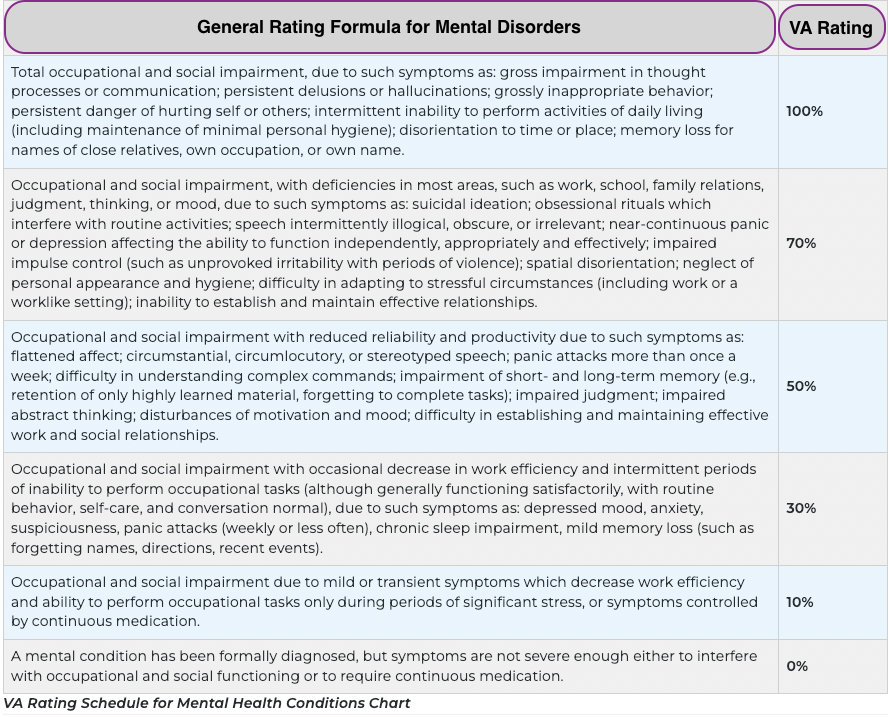Looking for Expert-Level VA Claim Answers?📱Call Us Now! 737-295-2226
If you are a veteran who struggles with mental health challenges, know that you are not alone—and YOU MATTER.
A 2021 BMC Psychiatry study reports the prevalence of depression in military service members was 23% and 11% of service members experienced suicidal ideation (i.e., thoughts of suicide or death).
The VA recognizes suicidal ideation (SI) as a severe symptom associated with mental health illnesses such as depression, anxiety, and post-traumatic stress disorder (PTSD).
Depending on severity of symptoms, you may be eligible for VA disability benefits for suicidal ideation linked with depression or other mental health conditions.
Let’s get started.
Table of Contents
Summary of Key Points
- Major depressive disorder (MDD) is a ratable mental health condition that may qualify for a VA rating of up to 100%.
- Suicidal ideation (SI) involves persistent thoughts of self-harm or suicide, which the VA considers a severe symptom of depression and other mental health conditions.
- Depression, anxiety, PTSD, and other mental health conditions are ratable disorders that are often linked with suicidal ideation.
- VA disability ratings for depression and suicidal ideation range from 0% to 100%, depending on how symptoms impact your ability to work and socially interact.

What is Suicidal Ideation? (VA Definition)
Suicidal ideation is a preoccupation or having recurrent thoughts about self-harm or taking one’s own life. Suicidal thoughts can range from fleeting to persistent thoughts to distressing urges.
What is Depression?
Many people suffer from a low mood from time to time. However, the medical type of depression, called “major depressive disorder (MDD)—commonly referred to as “major or clinical depression”—is different from occasionally feeling sad.
MDD involves certain symptoms as well as specific parameters around how long symptoms last, and other factors. These factors can be found in the DSM V (i.e., Diagnostic and Statistics Mental Disorders, Fifth Edition).
According to a U.S. Department of Veterans Affairs report, 1 out of 3 veterans report feelings of depression, and 1 in 8 to 1 in 10 have major depressive disorder (MDD).
MDD is a serious mental health condition involving an imbalance of the chemicals in the brain that help you feel good, called neurotransmitters, examples include dopamine and serotonin.
Symptoms
Major Depressive Disorder involves specific, ongoing symptoms, including:
- Low or depressed mood most of the day, almost every day
- Significantly diminished interest in nearly all social and other activities on most days
- Significant weight loss or weight gain or decreased or increased appetite on most days
- An observable (i.e., noticed by others) lower level of physical activity, slowed movement, and slower thought processes
- Fatigue or loss of energy on most days
- Feelings of severe guilt or worthlessness nearly every day
- Decreased concentration or indecisiveness on most days
- Recurrent suicidal ideation or thoughts of death without a specific plan, or suicidal ideation with a specific plan to commit suicide, or a suicide attempt
Contributing Factors for Veterans
Factors that may contribute to depression or suicidal ideation in veterans include:
- Post-traumatic stress disorder (PTSD)
- Persistent fear of a terrorist or hostile enemy attack
- Combat trauma (e.g., experiencing an IED explosion, witnessing another service member being injured or killed, or other traumatic events)
- Chronic pain from a trauma or injury
- Separation from loved ones and support system during deployment
- Difficulty adjusting back to civilian life after military discharge
Military service can result in trauma, which can have long-term effects, even years after the experience is over. These long-lasting effects could include depression, anxiety, or PTSD.
A 2023 review study indicated that veterans with PTSD have a higher risk of depression and suicide attempts. The National Center for PTSD reports that veterans with PTSD have a 2.6 times higher risk of attempting suicide.
While many contributing factors, such as social isolation from being away from friends and family, can contribute to depression and suicide ideation, many are not the primary cause of the disorder. However, you may still qualify for a VA suicide ideation rating.
For example, if you were diagnosed with depression before, or during your military service, then were stationed overseas or far away from your social network, and it caused feelings of isolation that worsened suicide ideation (SI), you may qualify for disability benefits.
Factors that increase the risk of suicidal ideation during and after military service include:
- Combat exposure
- Anxiety disorder
- Post-traumatic stress disorder (PTSD)
- Major depressive disorder (MDD)
- Obsessive-compulsive disorder (OCD)
- Adverse childhood experience
- Social isolation/lack of social support
- Deployment stressors
Often, veterans develop mental health concerns, such as suicide ideation, due to a combination of the above risk factors.
Suicidal Ideation (SI) and VA Disability
The presence of suicidal ideation can significantly increase your VA disability rating, even if you haven’t had a suicide attempt.
The VA doesn’t have a specific rating table for SI. There is just one VA’s Schedule for Rating Disabilities for all mental health conditions, and it features information about how suicide ideation increases the rating for conditions such as depression, anxiety, or PTSD. provided you meet the Veterans Affairs qualifications.
Common mental health conditions that could be considered your primary, service-connected diagnoses if you have suicide ideation include:
- Psychotic Disorders (e.g., schizophrenia or schizoaffective disorder)
- Mood Disorders (e.g., MDD, or bipolar disorder)
Major Depression and Suicidal Ideation VA Ratings
The VA rating for major depressive disorder and suicidal ideation is 0%, 10%, 30%, 50%, 70%, or 100%, depending on the severity of your symptoms and their impact on occupational and social functioning. The VA rates major depression under diagnostic code (DC) 9434 in the § 4.130 Schedule of ratings—Mental disorders.
VA Ratings for Mental Disorders Chart

Note: The 0 percent rating is non-compensable, meaning that it is not associated with any financial compensation. However, this rating is still critical because it establishes service connection for the condition and can potentially help the veteran receive an increased rating in the future. With the 0 percent rating, veterans have a diagnosis, but the symptoms may not be severe enough to interfere with occupational or social functioning
Service Connection for Depression & SI
To qualify for VA disability benefits for depression and suicidal ideation, you must establish service connection.
To establish service connection, you must prove that your mental health symptoms are caused or worsened by your military service by:
- Providing a current depression diagnosis (or another mental health diagnosis if applicable)
- Showing evidence of an event, injury, illness, or exposure during your military service that caused or contributed to your depression and suicide ideation.
- Proving a link, or “nexus” between your military service and mental health symptoms.
Pro Tip: A nexus can be shown in the form of a Nexus Letter written by a qualified healthcare provider, explaining that your depression and suicide ideation are at least as likely as not to be caused by an event or trauma that occurred during your military service.
What is an In-Service Event?
An in-service event can include a specific trauma or event during your military service, or something unrelated to your military job that occurred during active duty, such as a death in your family during deployment.

Active vs. Passive Suicidal Ideation
A person with “active suicidal ideation” is someone who has specific thoughts or an active intent to harm themselves (i.e., a suicide plan).
On the other hand, “passive suicidal ideation” involves thoughts about dying without a specific plan or intent to act on those thoughts.
Both active and passive suicide thoughts are considered serious, and all forms of suicidal ideation are critical factors in VA mental health disability ratings.
Note: It’s essential to report any type of suicide ideation to a healthcare provider and seek mental health support as soon as possible. If you have active suicidal ideation, seek emergency medical care, or call the National Suicide Hotline by dialing 988.
Veterans Crisis Line (Dial 988 and Press 1)
The Veterans Crisis Line is available 24/7/365 and provides confidential support to veterans (and their loved ones). You don’t have to be enrolled in VA benefits or healthcare to connect.
How to connect with the Veterans Crisis Line:
- By phone: DIAL 988 and PRESS 1
- Chat Online
- Text 838255
A Word from VA CIaims Insider
If you have symptoms of depression or thoughts of suicide, you may qualify for a VA disability rating of up to 70% or higher depending on various factors, such as how your symptoms impact your ability to work and socialize.
But first things first, it’s essential to seek professional help anytime you experience suicide ideation or major depression symptoms. Not only could it provide the help you need to improve your depression and stave off thoughts of suicide or self-harm, but it can also provide you with the medical documentation you will need to file your disability claim.
If you are suffering from suicidal thoughts, you can get immediate assistance on the National Suicide Hotline by dialing 988 and pressing #1.
Additional PTSD Resource Guide for Veterans and Families
(FAQs) Frequently Asked Questions
How can I connect with the Veteran Crisis Line if I’m struggling?
To connect with the Veterans Crisis Line:
- DIAL 988 and PRESS 1
- Chat Online
- Text 838255
Can I receive a VA rating for suicidal ideation without a suicide attempt?
Yes. The VA does not require a history of suicide attempts to qualify for a disability rating. Persistent suicidal ideation alone can qualify you for a 70% VA rating, depending on the severity of occupational or social impairment caused by your symptoms, and other factors.
Does the VA consider passive suicidal ideation for disability ratings?
Yes. Suicidal ideation, whether passive or active, is taken into account when determining a suicidal ideation VA rating, as both indicate extreme mental distress.
How do I prove service connection for major depression?
You must provide evidence of a current major depressive disorder (MDD) diagnosis, demonstrate an in-service event or stressor that likely caused or worsened your major depression, and provide a medical opinion linking (i.e., a nexus) your depression to a service-related event.
About VA Claims Insider

- VA Claims Insider is the #1 most trusted name in VA disability claims.
- Work directly with a VA claims coach who can help lead you to VA claim victory.
- 25,000+ disabled veterans served in our membership programs since 2016.
- 30% average rating increase for veterans who complete our #1 rated Elite program.
- 4.7/5.0 average rating out of 5,500+ total reviews; over 4,500 5-star reviews.
About the Author

Sherry Christiansen
Sherry Christiansen is a professional Medical Writer with a clinical mental health background. Over the last decade, she has written health and wellness articles for organizations like Medical News Today, Verywell Health, and Healthline. In 2013, she also helped launch an educational website for the first Alzheimer’s prevention clinic in the country at Weill Cornell Medical Center – NewYork-Presbyterian. As a spouse of a career military service member, Sherry is deeply passionate about supporting veterans. It is an honor for her to assist veterans in receiving the benefits they deserve after becoming ill or injured while serving our country.


